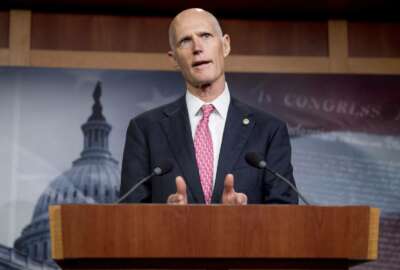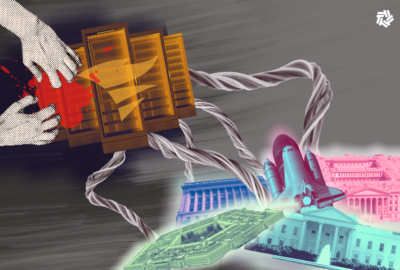
Senate skips town before confirming new CISA director
The Senate leaves town without confirming a new CISA director. OPM has its first permanent leader in a year. And the debate over expanding paid family leave for...
To listen to the Federal Newscast on your phone or mobile device, subscribe in PodcastOne or Apple Podcasts. The best listening experience on desktop can be found using Chrome, Firefox or Safari.
- Auditors have blasted a key data initiative from the General Services Administration. GSA’s transactional data reporting (TDR) initiative is relying on inaccurate and unreliable data and contracting personnel are not using the data to make decisions. A new report from GSA’s inspector general said TDR is introducing more risk into the contracting process by relying on flawed pricing tools. The IG recommends GSA stop adding new companies to the four-year-old TDR pilot and restrict access to TDR data. Sonny Hashmi, the commissioner of the Federal Acquisition Service, said GSA is working to correct the data issues and better train the workforce to use the information. GSA will continue to move forward with the TDR pilot.
- The Senate is on recess, and the Cybersecurity and Infrastructure Security Agency still doesn’t have a permanent director. The Senate left town this week without confirming President Joe Biden’s pick to lead CISA. Sen. Rick Scott (R-Fla.) said he is holding Jen Easterly’s nomination, along with all other nominees for posts at the Department of Homeland Security, until Vice President Kamala Harris visits the U.S.-Mexico border. Harris’ office said she will visit the border today. But the Senate is already on a state work period until July 9.
- The Defense Department is underestimating the risks in many of its major business IT programs. That’s the takeaway from a new Government Accountability Office report evaluating DoD’s 29 major IT projects. GAO found 10 of those programs had higher risk ratings than the scores reported to the Federal IT Dashboard by the DoD chief information officer. Hiring and training software talent remains a major obstacle for DOD. According to GAO, 18 of the major IT programs are facing software development workforce challenges.
- Spending through other transaction agreements saw a huge increase in fiscal 2020. New data from the Government Accountability Office found agencies spent more than $16 billion through this alternative acquisition approach. Of the $16 billion, agencies spent $9 billion through OTAs to respond to the pandemic. Overall, agencies spent more than $665 billion on procurement last year, which was $70 billion more than in 2019, with half of that coming in response to COVID-19.
- The Small Business Administration is reconvening its Council on Underserved Communities, as part of the Biden administration’s push for equity in government programs. The council includes 20 members that will advise SBA on how to strengthen its outreach to underserved communities. SBA is giving the public until July 20 to submit names of community leaders and small business owners they’d like to see serve on the board. SBA first established the council in 2010.
- Kiran Ahuja was sworn in virtually yesterday as Office of Personnel Management director. Ahuja thanked the OPM workforce for its efforts during the pandemic. She acknowledged the agency’s challenges and said it’ll take time to resolve them. She also said she’s in it for the long haul. OPM hasn’t had a permanent director in over a year.
- A bill introduced in the House and Senate would keep agency inspectors general working through government shutdowns. The Keep the Watchdogs Running Act would meet a longstanding legislative request from the governmentwide Council of the Inspectors General on Integrity and Efficiency to keep all IGs on the job during lapses in appropriations. IGs from independently funded agencies are already unaffected by shutdowns.
- A project between the Postal Service and General Services Administration moves beyond the pilot stage. The Postal Service and the General Services Administration are making seven post offices in the Washington, D.C. metro area permanent locations for federal employees and contractors to obtain or update their Personal Identity Verification (PIV) cards. The seven post office sites completed more than 11,000 appointments during the pilot phase, which ran from November 2020 to May 2021. Customers who participated in the pilot gave the service a 91% favorability rating.
- The debate over expanding paid family leave for federal employees turned ugly. Federal employees could take up to 12 weeks of paid leave to care for a sick family member, or themselves, under a bill from House Democrats. But Republicans said federal employees already have too many paid days off. That didn’t sit well with House Oversight and Reform Committee Chairman Carolyn Maloney (D-N.Y.) who said, “What we’re talking about [are] balanced policies, that I will say that most countries in the world already have, even Third World countries. We’re the greatest country in the world; can’t we respect our workers?”
- The House Appropriations Subcommittee on Financial Services and General Government easily advanced its 2022 bill. The legislation endorses a 2.7% pay raise for federal employees next year. It prohibits agencies from denying official time or telework to employees for specific reasons. It also gives the Office of Personnel Management, IRS and Office of Management and Budget additional funding next year. The full House Appropriations Committee will consider the bill next week.
- The National Guard is ahead of schedule in this year’s recruitment efforts. The Guard hit its recruitment target in May. Usually that happens in September. National Guard recruits are also getting older than usual, with more enlistments from those in their late twenties and early thirties. As the economy picks back up though, the National Guard said it expects many guardsmen to return to their civilian careers.
- The Department of State fell behind in implementing 15 recommendations from its inspector general. Four bureaus, including the comptroller, medical services and Counterterrorism and Countering Violent Extremism, missed their deadlines to respond to the IG by more than 150 days. The new IG report said the recommendations concerned the department’s travel card program, the Special Needs Education Allowance voucher approval program and mechanisms to track the total number and cost of physical security projects overseas. The IG suggested the agencies provide status updates within 30 days, and has already approved the department’s response.
- The Library of Congress Copyright Office is opening up its strategy to modernize its systems and processes to the public. The Copyright Public Modernization Committee includes a range of IT modernization stakeholders, who will provide input into the library’s new enterprise copyright system. It will hold public forums, where committee members will answer questions about copyright office modernization. Its next public meeting is in July. The committee will meet twice a year through twenty twenty four.
- The National Geospatial Intelligence Agency is making adjustments to make telework more permanent. Even as some employees return in-person, a large portion of NGA’s workforce is seeing up to 64 hours of telework per pay period. NGA has worked with its sign language interpreters to set up an operations center for its nearly 40 deaf employees to work remotely. Moving forward, the agency still has work to do in hardening its unclassified networks, despite receiving FedRamp certifications
Copyright © 2025 Federal News Network. All rights reserved. This website is not intended for users located within the European Economic Area.
Peter Musurlian
Peter Musurlian is a producer at Federal News Network.
Follow @PMusurlianWFED
Related Stories
(Amelia Brust/Federal News Network)

How CISA limited the impact of the SolarWinds attack
Related Topics




